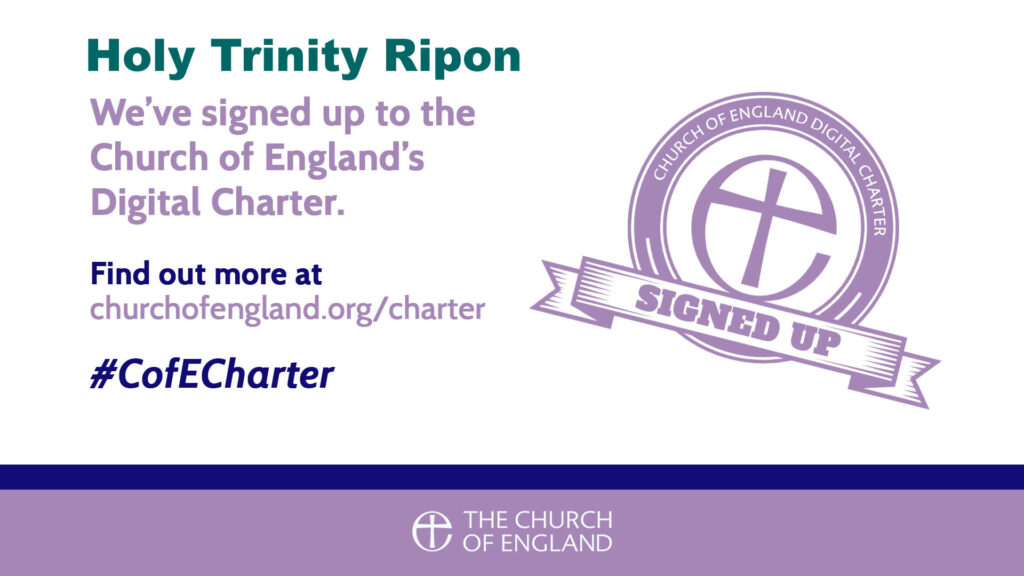Privacy
At Holy Trinity Ripon we collect different types of information about our users for the following main reasons:
- To provide a useful resource in the form of an online directory of users.
- To provide an interactive website where email is used to communicate with the users.
- To provide a security mechanism whereby we can restrict content to certain groups of users.
- To help us to improve the service we offer.
Our principles
We are absolutely committed to protecting your privacy. Our policy can be summarised in one sentence: we will not share your information with others without your consent.
We have established the following two principles:
- We will respect your email privacy. You will only receive email from Holy Trinity Ripon in relation to areas you have expressly signed up for.
- We will not share any individual user details (including your email address) to any third party without your consent.
What information do we collect?
We collect information on our users through registration.
The minimum information we need to register a user is your first and last name and a password. We also ask for some further, voluntary information so we can provide a richer, more useful address book.
Who will have access to your information?
You have control over who is able to access specific items of information. By default your personal information will be visible to other authenticated users of the site. You can change these settings from your personal profile page. Your information will be used to build the online address book and show your birthday in the Holy Trinity Ripon calendar.
What else you should know about privacy
Remember to close your browser when you have finished your user session. This is to ensure that others cannot access your personal information and correspondence if you share a computer with someone else or are using a computer in a public place like a library or internet cafe. You as an individual are responsible for the security of, and access to, your own computer.
Please be aware that whenever you voluntarily disclose personal information over the internet that this information can be collected and used by others. In short, if you post personal information in publicly accessible online forums, you may receive unsolicited messages from other parties in return. Ultimately, you are solely responsible for maintaining the secrecy of your usernames and passwords and any account information. Please be careful and responsible whenever you are using the internet.
Our pages may contain links to other websites, and you should be aware that we are not responsible for the privacy practices on other websites.
Digital Charter
This is a voluntary pledge that we as a church have signed up to. To help make social media and the web more widely positive places for conversations to happen. The digital landscape has changed so much in the last few years and will continue to do so as technology develops. It’s important to think about how the conversations we’re having can help change someone’s newsfeed for the better.
What does it look like to be a Christian online? Everyone’s engagement is different. Whether you’re a member of clergy using Twitter or a churchgoer replying to the comments on a blog, we all have different views, histories and areas of interest that will affect how we perceive things, and our responses to those events. The comments we make can reach thousands and even millions of people both in this country and around the world very quickly.
However, there are a number of ways we can make the digital world as loving and generous as we would when speaking face to face:
- Truth – we should hold ourselves to high ideals of checking that what we post online is fair and factual.
- Kindness – we are all different and that makes the world an interesting place – and at times a challenging one. Think the best of people, whether they share our views or are speaking against them and aim to be constructive in the way we engage.
- Welcome – in the language we use and the way we interact. It’s easy for Christians to speak in another language using words that those outside the Church might not relate to.
- Inspiration – we are called to be witnesses of our faith and to use social media in a way that genuinely engages others.
- Togetherness – we are one Church and other members of this Church are our brothers and sisters in Christ. It is crucial we treat those around us in this way.
- Safeguarding – if you have any concerns about the wellbeing of children, young people and vulnerable adults, please contact the relevant diocesan safeguarding adviser.
- Agree to the Church’s and Archbishops’ social media guidelines.

Any Questions?
Contact us via email at office@holytrinityripon.org.uk
Data Breach?
If you believe that we might have broken our pledge, or worse still, commited a data breach, please let us know by contacting our Data Protection Officer via email at data@holytrinityripon.org.uk where your concern will be treated in strict accordance with GDPR UK regulations and investigated thoroughly.
